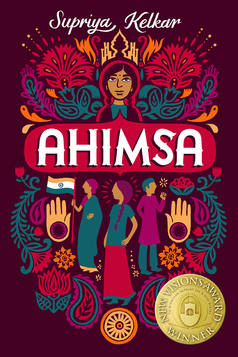Ahimsa
Review
By Kirkus Reviews
Although Kelkar's debut novel takes place in colonial India in the 1940s, when Indian citizens were fighting for independence from British rule, it is uncannily timely: 10-year old Anjali grapples with issues of social justice in many of the same ways young people are today. When Anjali's mother quits her job to become a freedom fighter, Anjali is reluctant to join the struggle, as it means she will have to eschew her decorated skirts and wear home-spun khadi (hand-woven cotton) instead, inviting the mockery of her school nemeses. But as her relationship with her mother evolves, her experience of and commitment to activism change as well. When her mother is imprisoned and commences a hunger strike, Anjali continues her work and begins to unlearn her prejudices. According to an author's note, Kelkar was inspired by the biography of her great-grandmother Anasuyabai Kale, and the tale is enriched by the author's proximity to the subject matter and access to primary sources. Kelkar also complicates Western impressions of Mohandas K. "Mahatma" Gandhi—Anjali realizes that Gandhi is flawed—and introduces readers to Dr. B.R. Ambedkar, a figure rarely mentioned in texts for young people in the United States but who is best known for campaigning against social discrimination of Dalits, or members of India's lower castes. This 2015 New Visions Award winner offers a complex narrative and inspires readers to check their privilege to address ongoing injustices.
Reviews & Comments
School Library JournalBooklist
Padma Venkatraman, author of THE BRIDGE HOME
Uma Krishnaswami, author of STEP UP TO THE PLATE, MARIA SINGH
Vidhu Vinod Chopra, director of the films 1942: A LOVE STORY and EKLAVYA: THE ROYAL GUARD
Rajkumar Hirani, director of the films 3 IDIOTS, PK, and LAGE RAHO MUNNABHAI
Foreword Reviews
Publishers Weekly







